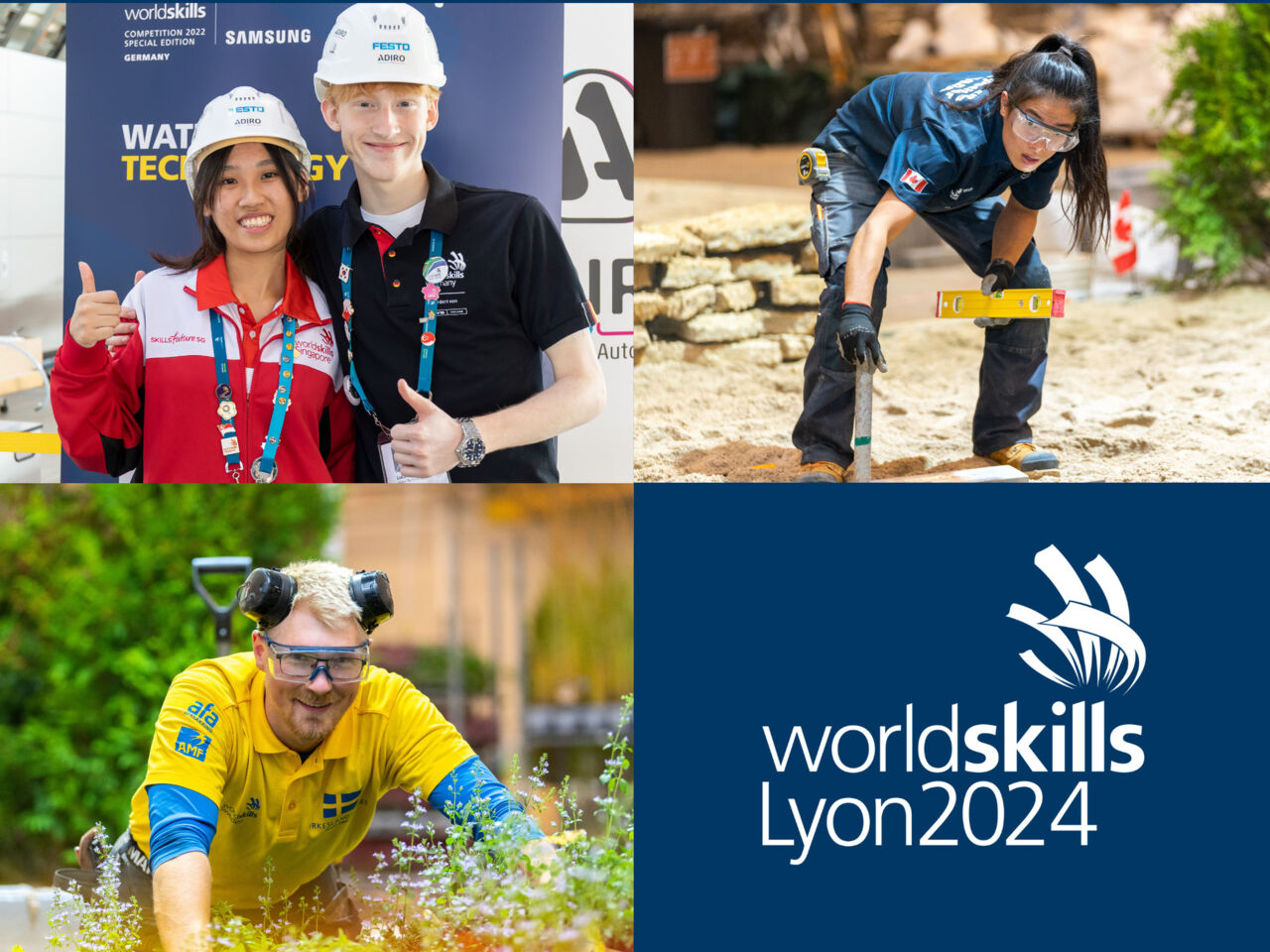26 April 2024
WorldSkills Lyon 2024 advances ambitious six-pillar sustainability strategy
How can an international skills competition inspire, educate, and advance sustainability, and contribute towards a fairer and more resilient world? This is the question that the WorldSkills Lyon 2024 Organizing Committee plans to answer with its ambitious sustainability strategy.

Formed as part of its 2019 bid to host the 47th WorldSkills Competition, WorldSkills Lyon 2024 has made it a priority to build a strong relationship with local people and places, as well as minimize the impact on our planet. The hope is that these six sustainability pillars and their respective targets will help WorldSkills Lyon 2024 secure ISO 20121 certification – a global accreditation for sustainable event management and a new benchmark for WorldSkills International Members and future Competition Organizers to improve their own sustainable practices.
WorldSkills Lyon 2024 surveyed nearly 50 WorldSkills Partners and Sponsors in March 2024 to ensure the pillars also mirrored their needs. According to the survey results, 84% said they were already committed to a sustainable development approach and 59% said they already held a sustainable certification or were in the process of obtaining one.
“We know that skills development is a key driver of sustainability especially when it is at the heart of government, industry, and education strategies,” said Samuel Torikian, Head of Sustainability at WorldSkills Lyon 2024. “Our ambition is based on six pillars in which we develop tangible objectives for responsible management of our event and its impact, particularly with regard to the environment.”
The six pillars are:
Pillar 1: Circular Economy and Waste
WorldSkills Lyon 2024 intends to reduce waste, promote reuse, and recover residual waste. Its first step will be to maximize the reuse of materials required for the Competition. The goal is to reuse an impressive 80% of materials through donations, sales, loans, and rentals. By prioritizing reuse over recycling, WorldSkills Lyon 2024 is determined to significantly reduce the waste impact of the event and show the world what the circular economy looks like in action.
WorldSkills Lyon 2024 has also set a target to recycle 80% of waste and transform it into new, usable materials. Crucially, this supports its mission to reduce the overall volume of materials used by at least 25% compared to the previous Competition, WorldSkills Kazan 2019.
Pillar 2: Carbon Footprint, Water, and Energy Consumption
Elsewhere, WorldSkills Lyon 2024 is embarking on a comprehensive carbon footprint assessment. This deep dive into the event’s emissions is designed to pinpoint areas where significant improvements can be made. Armed with this knowledge, it plans to reduce direct CO2 emissions by at least 20% compared to previously estimated levels. WorldSkills Lyon 2024 is also investing in CO2 reduction projects in France itself and hopes to achieve a 25% reduction in indirect emissions.
Sustainability involves managing not only carbon emissions but also other resources such as energy and water. That is why the organization is conducting a thorough provisional calculation and preparing a comprehensive consumption report. This report will provide a clear picture of the event’s current status and identify opportunities for optimization. The aim is to reduce consumption by at least 15%.
Pillar 3: Local and French Know-How
When it comes to delivering a truly sustainable event, WorldSkills Lyon 2024 knows that who you work with is just as important as what you do. As a result, it is putting a strong emphasis on promoting local and French stakeholders. Sourcing goods and services from nearby suppliers will significantly reduce the carbon footprint associated with transportation and logistics.
Supporting regional businesses also boosts the local economy, creating jobs and spurring innovation. This is why WorldSkills Lyon 2024 has committed to a target of ensuring 50% of purchases are made locally or within France.
Pillar 4: Inclusion and Diversity
A WorldSkills Competition is a global celebration that should be accessible to everyone. That is why WorldSkills Lyon 2024 is dedicated to ensuring universal access to Competition venues and events. All public sites will be 100% accessible to people with reduced mobility, meeting and exceeding French accessibility regulations. The Competition will also feature at least three on-site facilities to provide better access and communication for people with sensory, mental, and psychological disabilities.
WorldSkills Lyon 2024 itself will lead by example, moving towards gender parity in all management positions. The event’s volunteer programme will also integrate diversity metrics, making sure that the spirit of inclusion permeates every aspect of the Competition.
Pillar 5: Security and Well-being
The safety and well-being of attendees are being carefully considered by WorldSkills Lyon 2024. A comprehensive control plan for prevention, safety, and emergency response is already set out, with the goal of zero accidents. To help Competitors perform at their best, the event will feature at least three dedicated wellness facilities, offering activities like relaxation, sports, and cultural experiences.
Pillar 6: Ethical and Transparent Governance
We know that sustainability is about how an event operates, as well as what it achieves. This is why WorldSkills Lyon 2024 is pursuing ISO 20121 certification to validate its responsible management system and fulfil a key promise made during the bidding process. Obtaining this global accreditation for sustainable event management will in turn inspire Members and Partners to improve their sustainable practices.
After the event, the Organization will release a sustainability report, detailing its performance in all of its sustainability targets.
WorldSkills Lyon 2024 will show the world that Where there is a skill, There is a way. A major industrial centre and a global reference for gastronomy and cuisine, the city of Lyon will host the 47th WorldSkills Competition from 10 to 15 September 2024. Approximately 1,500 Competitors from over 70 countries and regions will compete in 62 skill competitions. Organizing the Competition in France aligns with the country’s strategy to promote vocational education and training and transform it to adapt to current and future employment needs.